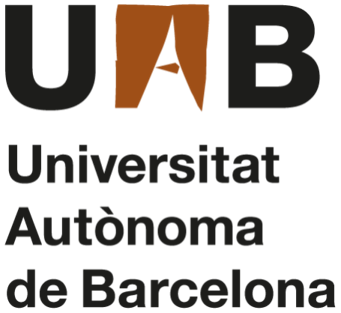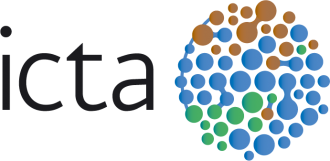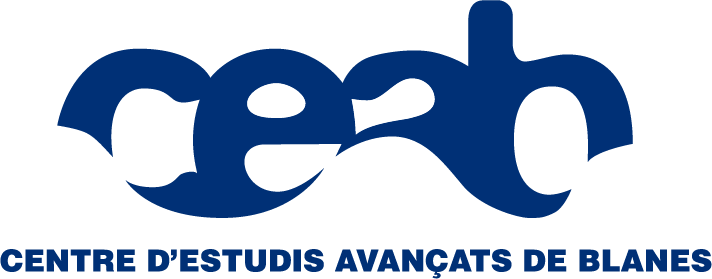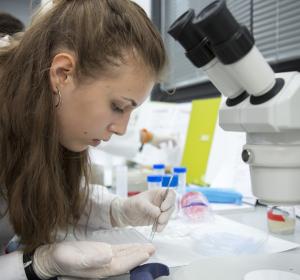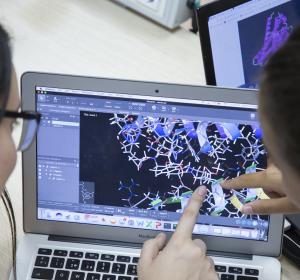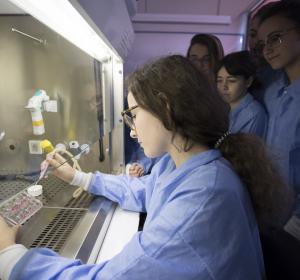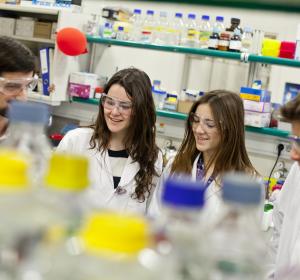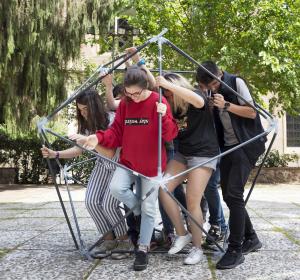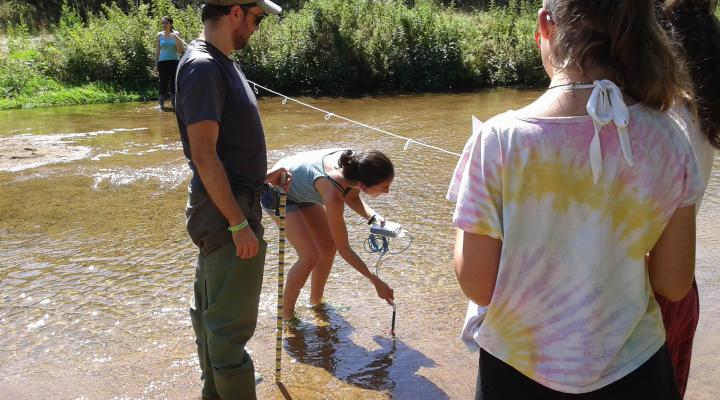
Sustainability
The course
The Earth Sciences course from the Mad for Science programme of the Catalunya La Pedrera Foundation is a course developed by the Institute of Environmental Science and Technology (ICTA-UAB) aimed at 1st year A-Level students with a scientific vocation. This course was created with the idea of introducing the multidisciplinary environment offered by environmental sciences and sustainability, where different disciplines come together to solve problems related to the environment, waste, socioeconomy, sustainability, biodiversity and climate change. The main objective of this course is to foster scientific vocations and promote the knowledge and education of excellence of young people in Catalonia.
The course is taught over different Saturdays from January to October of 2024 at the facilities of the Institute of Environmental Science and Technology (ICTA-UAB).
During 16 theoretical and practical sessions students find out closely about research in major areas applied in environmental science and technology such as sustainability, climate change, resource use, recycling, biodiversity, environmental cooperation and behaviour and ecology, among others. In addition, they will be able to see processes such as photosynthesis, learn about the bioindicative role of macroinvertebrates, shore vegetation and aquatic mammals, how an urban vegetable garden grows, composting organic matter, and explore the role of local communities in the study of climate change.
The course will cover the following areas:
- Sustainability
- Biodiversity
- Experimental economics and cooperation in climate change
- Circular economics
- Fires and climate
- Waste
- Urban agriculture
- Recovery of metals like gold from mobile phones
- Public science and perception of climate change
- Photosynthesis
Specific objectives
Academic studies
Fostering among young people the scientific vocations linked to the world of environmental science and technology and sustainability, helping to guide their academic and professional future.
Providing the opportunity for A-Level Research Projects to be tutored by a leading research centre.
Research
Bringing students closer to Earth sciences research.
Understand the operation of research centres linked to environmental science and sustainability.
Academia
Working in a multidisciplinary environment with teachers and researchers with different basic training, in social sciences, earth sciences or technology.
Science
Examining different scientific fields with the help of researchers from the ICTA-UAB research groups and the Department of Chemical, Biological and Environmental Engineering of the UAB:
Ecological Economy ECONECOL
Conservation, Biodiversity and Global Change
Sustainability and Environmental Protection SOSTENIPRA
Dynamics of natural systems and the anthropic impacts ImpactANT
Laboratory for the Analysis of Social-Ecological Systems in a Globalised world LASEG
GICOM composting research group
Sessions 2024
Day: Saturday to be determined, 2024.
Opening hours: 10 am to 2 pm.
Location: ICTA-ICP building, Carrer de les Columnes s/n, Campus de la UAB, Bellaterra, Barcelona.
Session coordination: M Rosa Rovira.
Session given by: M Rosa Rovira.
Language: catalan and spanish.
Introductory session in which the scientific and academic environment of the ICTA-UAB is first presented with the main features of the Healthy and Sustainable campus of the UAB, with a marked commitment to sustainability.
The Institute of Environmental Science and Technology (ICTA-UAB), Maria de Maeztu Unit of Excellence in Climate Change and Global Change, is presented, a multidisciplinary center that promotes research and postgraduate training in environmental and sustainability sciences. The ICTA-UAB research areas are developed through specific research groups (SGR) that share an interest in the study of the causes, mechanisms and impacts of global environmental change, including climate change, the ultimate interactions with human societies and the welfare; and the political and institutional responses necessary for a transition towards a more sustainable future.
The research groups are briefly presented:
Aerobiology, atmospheric transport and health (AEROBIOTAS).
Integrated assessment: sociology, technology and environment (IASTE).
Marine and environmental biogeosciences (MERS).
Ecological economy (ECOLECON).
Dynamics of natural systems and anthropogenic impacts (SHOCKING).
Laboratory for analysis of socioecological systems in globalization (LASEG).
Sustainability and environmental protection (SOSTENIPRA).
The future of science in our society is presented: the ECIU university, the first European university, and its SMART-ER research institute, which is a new model of research and innovation, based on a collaborative virtual environment, which brings together scientists and researchers from the 12 member universities to work on joint research initiatives and projects to address complex social challenges within the framework of the United Nations Sustainable Development Goal (SDG) 11 Sustainable Cities and Communities.
Day: Saturday to be determined, 2024.
Opening hours: 10 am to 2 pm.
Location: ICTA-ICP building, Carrer de les Columnes s/n, Campus de la UAB, Bellaterra, Barcelona.
Session coordination: Anna Porcuna-Ferrer.
Session given by: Anna Porcuna-Ferrer and Victoria Reyes-García.
Language: catalan, spanish and english.
Scientists have spent years researching the effects of climate change. Based on these studies, we know that the alterations taking place on a global and local scale are many and varied. During the workshop we will discuss what we know about the effects of climate change on biophysical systems, and what have been the main scientific methods that have allowed us to gain this knowledge. We will also ask, "Do we have to be a scientist to perceive that the climate is changing?" We answer this question by exploring how people around the world perceive climate change and its effects. Finally we will discuss: "And what can we do about it?"
This session is organised in the context of the research project "LICCI - local indicators of the impacts of climate change", an international project that aims to bring local knowledge to climate change research. You can find more information about the project at the following link: https://licci.eu/(link is external)
The session is designed to help students work and critically get acquainted with different media (news, web search, scientific articles, documentary videos, etc.). Through the project's citizen science platform (link is external), each student group will work with a particular climate zone and a particular population, ethnicity or indigenous group. The session presents different dynamics to reconstruct and understand how climate change affects both the biophysical environment and the way of life of the people who live in it. Activities will also be held to reflect on our relationship with climate change: how we perceive and contribute to climate change.
Day: Saturday to be determined, 2024.
Opening hours: 10 am to 2 pm.
Location: ICTA-ICP building, Carrer de les Columnes s/n, Campus de la UAB, Bellaterra, Barcelona.
Session coordination: Gara Villalba.
Session given by: Verónica Vidal.
Language: catalan.
In this section, students work on the transport of substances through air and water with respect to photosynthesis and respiration in ecosystems. Simplified and scaled physical models of aquatic and terrestrial ecosystems (soils, vegetation, sediments, lakes) are assembled to study the exchange of gases (water vapor, greenhouse gases, reactive gases). Interactions between the environment and the activity of organisms are measured through the quantification of CO2 emitted.
Day: Saturday 16th Mars, 2024.
Opening hours: 10 am to 5 pm.
Location: Montserrat - Coll de Can Maçana.
Session coordination: Team Fundació Catalunya La Pedrera.
Session given by: David Sàez, Susanna Izquierdo i Josep Mª Fabra.
Language: catalan.
The session is divided into 4 activities:
1. Geological history of Montserrat.
Introduction to the formation of Montserrat at different strategic points for the detailed observation of the different stratigraphic sections that make up the space. Study of the Paleozoic materials pre-existing in the formation of Montserrat and on which it was deposited. Panoramic view and context of Montserrat. Route from the Montserrat Information Point – Can Maçana to Sant Pau Vell (20 minutes one way) to observe the formation of Montserrat as a delta of a sea basin and the vision of the needles and the formation of the relief characteristic of the mountain. Analysis of the different levels that make up Montserrat (conglomerates, sandstones, clays), their hardness and differential erosion. Geological hazards (falling blocks).
2. Management of a natural park: forestry management of the Montserrat-Can Maçana area.
Introduction to the development and characteristics of the management plan of a natural space, taking as an example the management carried out in the Montserrat Mountain Natural Park. Analysis of the LIFE Montserrat project and the actions that have been taken in the park for its management: controlled burning of flora, repopulation with species of interest, monitoring of animal species, etc.
3. Assessment of the state of the forest.
Study of the plant cover of different areas of the Coll de Can Maçana estate of the Fundació Catalunya La Pedrera. Field practice to measure the quality of an area of the forest: transects for counting species, measuring tree diameters and calculating the age of the forest.
4. Management measures.
Analysis of the differences between a healthy and managed forest and an unmanaged forest. Measurement of tree diameters.
Day: Saturday to be determined, 2024.
Opening hours: 10 am to 2 pm.
Location: ICTA-ICP building, Carrer de les Columnes s/n, Campus de la UAB, Bellaterra and UAB experimental fields.
Session coordination: Dr. Gara Villalba and Esther Molina Peñate.
Session given by: Dr. Gara Villalba and doctoral students Veronica Arcas and Susana Toboso; Esther Molina Peñate and Laura Mejias Torrent.
Language: catalan.
We will learn how urban agriculture promotes more optimised use of resources in cities, making them more sustainable and self-sufficient. We work in the greenhouses of the ICTA building, preparing substrates and planting vegetables, determining the water and nutrients needed.
We plant a seedling that will be followed over the 3 sessions. Each participant is in charge of 4 different plants; we experiment with different substrates and working conditions and irrigation. Each participant will have to design their own system.
Day: Saturday to be determined, 2024.
Opening hours: 10 am to 2 pm
Location: ICTA-ICP building, Carrer de les Columnes s/n, Campus de la UAB, Bellaterra, Barcelona and UAB experimental fields
Session coordination: Dr. Gara Villalba and doctoral students Veronica Arcas and Susana Toboso
Session given by: Dr. Gara Villalba and doctoral students Veronica Arcas and Susana Toboso
Language: Catalan
We learn to use the resources that cities offer us for food production. We will talk about the connections that can occur between urban spaces and agriculture to be more resilient, sustainable and self-sufficient. During this session we will do a practical part in which we will plant lettuce in the ICTA greenhouse.
Current food production systems are designed to supply our needs, but what is the loss that is generated and that we do not see? We thoroughly explore the production chains, we look for solutions and we will experience with our lettuce cultivation the waste that is suffered in the field.
Day: Saturday to be determined, 2024.
Opening hours: 10 am to 19 pm.
Location: river Tordera.
Session coordination: Dr. Roser Maneja and Dr. Sònia Sànchez-Mateo
Session given by: Dr. Sònia Sànchez-Mateo, Toni Mas and Quim Zaldo
Language: catalan.
We find out what the bioindicative role of macroinvertebrates, shore vegetation and aquatic mammals is by assessing the ecological status of river courses, using the methodologies used in the Tordera and Besòs Observatory project.
Day: Saturday to be determined, 2024.
Opening hours: 10 am to 2 pm.
Location: Cala Sant Francesc de Blanes.
Session coordination: Centre d'Estudis Avançats de Blanes (CEAB) i Associació Xatrac.
Session given by: researchers of CEAB and Xatrac.
Language: catalan.
In this session, you will delve into the study of plant and marine animal biodiversity in Cala de Sant Francesc de Blanes in a practical way. You have the opportunity to discover its seabed by going snorkeling with professional biologists from the Xatrac entity. In addition, you can get to know the main coastal benthic communities in situ, analyze their characteristics and ecological status, and understand the importance of the conservation of marine biodiversity at the hands of researchers from the Center for Advanced Studies of Blanes (CEAB).
Day: Saturday to be determined, 2024.
Opening hours: 10 am to 2 pm.
Location: ICTA-ICP building, Carrer de les Columnes s/n, Campus de la UAB, Bellaterra, Barcelona.
Session coordination: Isabel Lopera.
Session given by: Isabel Lopera.
Language: catalan and spanish.
We introduce the main methodologies for scientific communication and the dissemination of science. How to write a scientific article, and how to prepare your presentation for the next session.
Day: Saturday to be determined, 2024.
Opening hours: 10 am to 2 pm.
Location: ICTA-ICP building, Carrer de les Columnes s/n, Campus de la UAB, Bellaterra, Barcelona.
Session coordination: to be determined.
Session given by: to be determined.
Language: spanish and catalan.
Presentation of the work done by the participants on the course during the class. Each student presents one of the sessions, where we show the goals and main results obtained in that session by the whole group.
